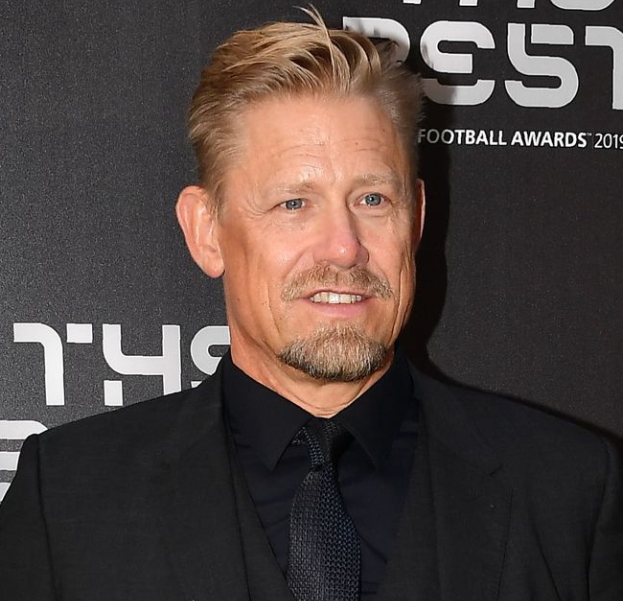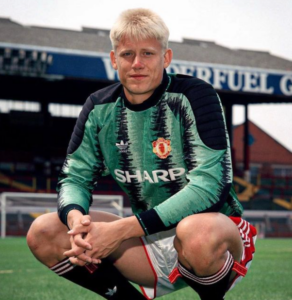Peter Schmeichel’s Critique: Erik ten Hag’s Struggle for Support at Manchester United
Erik ten Hag joined Manchester United with a strong reputation, eager to bring fresh tactics and consistency to a club known for its legacy but battling to reclaim its former glory.1
As a former Ajax manager, Ten Hag’s philosophy and tactical depth made him an appealing choice, yet according to United legend Peter Schmeichel, the Dutchman faced an uphill battle from the start.
Table of Contents
The Void of Managerial Support
Schmeichel’s comments point to an underlying issue within United’s managerial infrastructure. Football managers thrive when their visions are fully endorsed by both the players and the board, allowing them to access necessary resources.
At United, however, Ten Hag allegedly faced a discrepancy between his expectations and the club’s actual support. According to Schmeichel, the lack of reinforcements left Ten Hag to “work on his own,” struggling to implement changes with an incomplete squad that did not fully align with his tactics.
Transfer Market Failures and Missed Opportunities
- One of the most tangible impacts of Ten Hag’s limited support was in the transfer market.
- Despite an initial transfer budget, Schmeichel insists that Ten Hag lacked the necessary backing to bring in key players to bridge gaps in United’s formation.
- Ten Hag’s vision focused on shoring up both midfield control and defense, seeking players who could adapt to his high-pressure, possession-based system.
- However, United’s transfer activity was criticized for not aligning with these needs. Schmeichel has emphasized the critical misalignment in recruitment that eventually affected Ten Hag’s tactics.
The Challenges of Competing with a Disjointed Squad
The pressures of modern football require a manager to lead not only with tactical ingenuity but also with a squad that is in sync with their philosophy. Without reliable acquisitions, Ten Hag was forced to rely on players who may have lacked the attributes his style demanded.
The team’s consistency suffered, with sporadic performances exposing weaknesses in defense, midfield control, and finishing. For example, matches against more physically demanding teams left United vulnerable, as the available players did not have the required versatility to adjust to Ten Hag’s high-tempo pressing game.
Also Read: Jules Kounde (Footballer) Bio, Age, Career, Net Worth, Personal Life And More
Paul Scholes’ Verdict: Manchester United’s Decline Under Erik ten Hag
Manchester United legend Paul Scholes recently voiced a harsh assessment of the club’s current situation, claiming that United is in a worse position than when Erik ten Hag first took over.2
View this post on Instagram
Scholes argued that Ten Hag’s tenure, initially welcomed with optimism, has yet to show any marked improvement and lacks the foundational progress needed to steer the club toward lasting success.
The Optimism Surrounding Ten Hag’s Appointment
When Erik ten Hag joined Manchester United in 2022, he came with an impressive resume from Ajax, where he led a young, dynamic team known for their attractive, attacking style. United fans and management hoped he would reinvigorate the squad, stabilize performance, and nurture young talent in the process.3
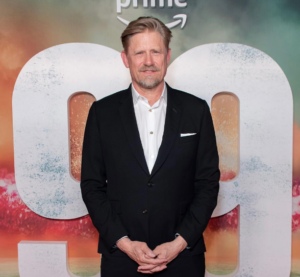
As the first Dutch manager in United’s history, Ten Hag arrived with a bold vision of high-press football, fast transitions, and player development. His past achievements fostered hope that he could be the long-awaited answer to United’s search for stability after the post-Sir Alex Ferguson era saw a carousel of managers come and go.
Scholes’ Criticism: Lack of Tangible Progress
According to Scholes, however, these early hopes have not been met. The former United midfielder argues that Ten Hag has not made the anticipated strides in improving the squad’s performance or bolstering team cohesion.
Scholes pointed to inconsistent results, defensive issues, and a lack of cohesive play as signs that the team may be worse off now than when Ten Hag first arrived.
Defensive Woes and Midfield Vulnerabilities
One area that Scholes highlighted is United’s defense, which has continued to struggle despite investment in new players. Under Ten Hag, United’s defensive fragility has come to the forefront in high-stakes games against aggressive, high-pressing teams.
Despite the arrival of high-caliber defenders like Lisandro Martínez and the presence of experienced players like Raphaël Varane, the defense often appears disjointed and prone to lapses. The midfield, too, has lacked the cohesion needed to control games effectively, often leaving the defense exposed.
Peter Schmeichel: The Unstoppable Force in Goalkeeping and Manchester United Legend
Peter Boleslaw Schmeichel, known for his exceptional goalkeeping prowess and towering presence on the field, remains one of the most celebrated figures in football history. Born on November 18, 1963, in Gladsaxe, Denmark, Schmeichel carved a distinguished career that spanned nearly two decades.
With accolades including the IFFHS World’s Best Goalkeeper in 1992 and 1993 and a Champions League victory with Manchester United, Schmeichel’s contributions to the sport are monumental. His leadership, athleticism, and resilience solidified him as an icon not just at United but also in the annals of world football.
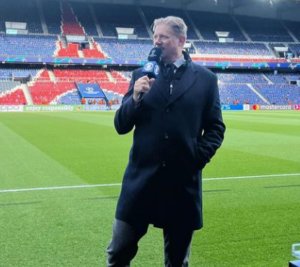
Early Life and Football Beginnings
Born to a Polish father and Danish mother, Schmeichel was introduced to sports at a young age. His family encouraged physical activity, and he displayed athletic potential from the start. However, his journey to professional football wasn’t straightforward.
30 years ago I signed for the greatest club in the world. On days like these a lot of memories are brought back. Remember it all like it was yesterday #MUFC 💫🔴⚪️⚫️ pic.twitter.com/YevkQpispY
— Peter Schmeichel (@Pschmeichel1) August 6, 2021
Schmeichel’s family wasn’t well-off, and he had to work various jobs to support himself. He spent time as a carpet fitter before focusing solely on his dream of becoming a footballer. He started his career as an amateur but quickly rose through the ranks.
Rise Through Danish Football
Schmeichel’s professional career began with Hvidovre IF, a local club in Denmark. His performance with Hvidovre caught the eye of Danish football scouts, and he soon moved to Brøndby IF, where his career took off. At Brøndby, Schmeichel showcased his talent and began developing a reputation as a dependable and commanding goalkeeper.
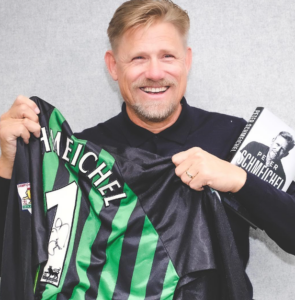
His four Danish league titles with Brøndby served as a precursor to the success that awaited him. By the time he left Denmark for England, Schmeichel had become a household name, known for his exceptional shot-stopping abilities, distribution skills, and leadership on the field.
Manchester United: Building a Legacy
In 1991, Sir Alex Ferguson signed Peter Schmeichel for Manchester United for a mere £505,000—a fee often cited as one of the greatest bargains in football history. United was undergoing a transformation, and Schmeichel became a cornerstone of Ferguson’s team.
Schmeichel brought with him a combination of raw talent, fierce determination, and a commanding presence that would soon become his trademark. His vocal presence on the field and his willingness to organize and direct his defense quickly made him a fan favorite.
Also Read: Trevor Etienne Impact: The Future of Georgia Football After Close Loss to Texas
